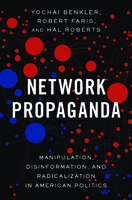Network Propaganda
Manipulation, Disinformation, and Radicalization in American Politics
| dc.contributor.author | Benkler, Yochai | |
| dc.contributor.author | Farris, Robert | |
| dc.contributor.author | Roberts, Hal | |
| dc.date.accessioned | 2018-10-03 23:55 | |
| dc.date.accessioned | 2019-11-26 14:57:52 | |
| dc.date.accessioned | 2020-04-01T12:21:26Z | |
| dc.date.available | 2020-04-01T12:21:26Z | |
| dc.date.issued | 2018 | |
| dc.identifier | 1001606 | |
| dc.identifier | OCN: 1076777936 | en_US |
| dc.identifier.uri | http://library.oapen.org/handle/20.500.12657/28351 | |
| dc.description.abstract | "Is social media destroying democracy? Are Russian propaganda or ""Fake news"" entrepreneurs on Facebook undermining our sense of a shared reality? A conventional wisdom has emerged since the election of Donald Trump in 2016 that new technologies and their manipulation by foreign actors played a decisive role in his victory and are responsible for the sense of a ""post-truth"" moment in which disinformation and propaganda thrives. Network Propaganda challenges that received wisdom through the most comprehensive study yet published on media coverage of American presidential politics from the start of the election cycle in April 2015 to the one year anniversary of the Trump presidency. Analysing millions of news stories together with Twitter and Facebook shares, broadcast television and YouTube, the book provides a comprehensive overview of the architecture of contemporary American political communications. Through data analysis and detailed qualitative case studies of coverage of immigration, Clinton scandals, and the Trump Russia investigation, the book finds that the right-wing media ecosystem operates fundamentally differently than the rest of the media environment. The authors argue that longstanding institutional, political, and cultural patterns in American politics interacted with technological change since the 1970s to create a propaganda feedback loop in American conservative media. This dynamic has marginalized centre-right media and politicians, radicalized the right wing ecosystem, and rendered it susceptible to propaganda efforts, foreign and domestic. For readers outside the United States, the book offers a new perspective and methods for diagnosing the sources of, and potential solutions for, the perceived global crisis of democratic politics." | |
| dc.language | English | |
| dc.subject.classification | thema EDItEUR::J Society and Social Sciences::JP Politics and government | en_US |
| dc.subject.other | American presidential politics | |
| dc.title | Network Propaganda | |
| dc.title.alternative | Manipulation, Disinformation, and Radicalization in American Politics | |
| dc.type | book | |
| oapen.identifier.doi | 10.1093/oso/9780190923624.001.0001 | |
| oapen.relation.isPublishedBy | b9501915-cdee-4f2a-8030-9c0b187854b2 | |
| oapen.relation.isbn | 9780190923624 | |
| oapen.imprint | OUP USA | |
| oapen.pages | 472 | |
| oapen.place.publication | New York, US | |
| oapen.identifier.ocn | 1076777936 |

